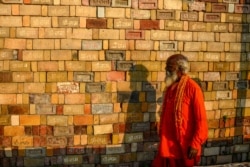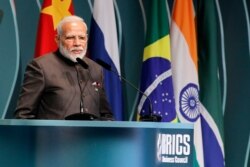NEW DELHI — It is business as usual in New Delhi's biggest Muslim neighborhood days after a landmark Supreme Court verdict gave Hindus permission to build a temple on a site contested for decades with Muslims in Ayodhya town in northern India.
Stall owners hawk their goods in the crowded bylanes and people pray at the capital's biggest mosque, the Jama Masjid, while others sit on the roadside mulling over the recent judgment. But behind the hustle and bustle, there is a resigned acceptance and disappointment among some Muslims that the judgment did not go in their favor.
"There is no point in objecting," shrugged Rahmat Ali, who recalls the demolition of a mosque in 1992 in Ayodhya by a Hindu mob that triggered communal riots. "Those who have the power will get their way," he said, referring to the country's Hindu nationalist Bharatiya Janata Party government led by Prime Minister Narendra Modi.
Some hope the verdict on one of the oldest and most contentious disputes between India's majority Hindu and minority Muslim communities will pave the way for reconciliation.
But the concern among others is that it has heightened a growing sense of insecurity among Muslims who fear that the BJP government is pressing ahead with a Hindu-majoritarian agenda.
"The kind of atmosphere prevalent in the country today, Muslims do feel a little suppressed," said Mohammad Qayoom, a businessman from Uttar Pradesh, the state where the temple will be built.
For Hindus, the approval to build a temple on the spot where the 16th-century mosque once stood fulfills a long-cherished dream — they believe it is the exact birthplace of their god Rama.
But the court verdict, which allotted an alternative plot of land to build a mosque, did little to placate Muslim groups who say that justice has not been delivered.
"That is another sacrilege of the masjid, in fact. You ... are taking away our right. ... And to put the salt on our injuries, you are saying, 'That five acres of land, you take.' Did we ask you? Did any Muslim ask you to give us this charity?" said Kamal Farooqui, a member of the All India Muslim Personal Law Board, a prominent organization representing Muslims.
Balancing act
Reaching a verdict that would satisfy both Hindus and Muslims in India's most bitter dispute —which has lingered in courts since the 1950s — was never easy, according to political commentators.
The court heard arguments that the mosque was built on the ruins of a temple nearly 500 years ago and had to study archaeological evidence to back that claim. It called the mosque's demolition illegal but handed the plot of land to Hindus.
"It's taken into account fact and law, but it has also taken into account history and the social setup, politics and the current environment in the country and done, I think, a very fine balanced act," according to Neerja Chowdhury, an independent political analyst in New Delhi.
Modi has underplayed the legal victory for Hindu nationalists, calling it neither a win nor a loss for anyone, and he has expressed hope that the verdict will allow the country to move forward. There have been no marches or celebrations by Hindu groups, to avoid a sense of triumph over Muslims.
Underlining that the message from the recent verdict is to unite and live together, Modi said "in the new India, fear, animosity and negativity should have no place."
Some are heeding that call and hope that his government focuses on bread-and-butter issues at a time when a sagging economy is hurting many ordinary people.
"There is no point in being entangled any longer in this temple-mosque issue. People are scrambling to manage their day-to-day lives," according to Mohammad Naseem Azam, who runs a small travel business that, he said, has lost 50 percent of its business in the last year.
Hindu-first agenda?
The verdict will give a huge boost to the BJP, whose strong backing for the campaign to build the temple catapulted it to political prominence during the 1990s.
Modi's second term in power has reinforced apprehensions among Muslims that his government will press ahead with a Hindu-first agenda.
In August, the government stripped the autonomous status of Kashmir, India's only Muslim-majority region. The move was widely supported in the rest of India, but created unease among Muslims.
"Many people have felt, 'Are we second-class citizens in India? Will we get justice, political participation and fair play?' Those are question marks that have been raised," said Chowdhury. "And whether it is the government, whether it is civil society, it has to create a sense of confidence in minorities once again."
Muslim leaders, who say the challenge is to ensure that the country maintains its secular constitution, are debating whether to file for a review of the judgment delivered by a five-judge bench.
"We are not a Hindu rashtra [nation], we are not a Muslim rashtra, we are a secular rashtra. And secular means we have the fundamental rights," Farooqui said.








